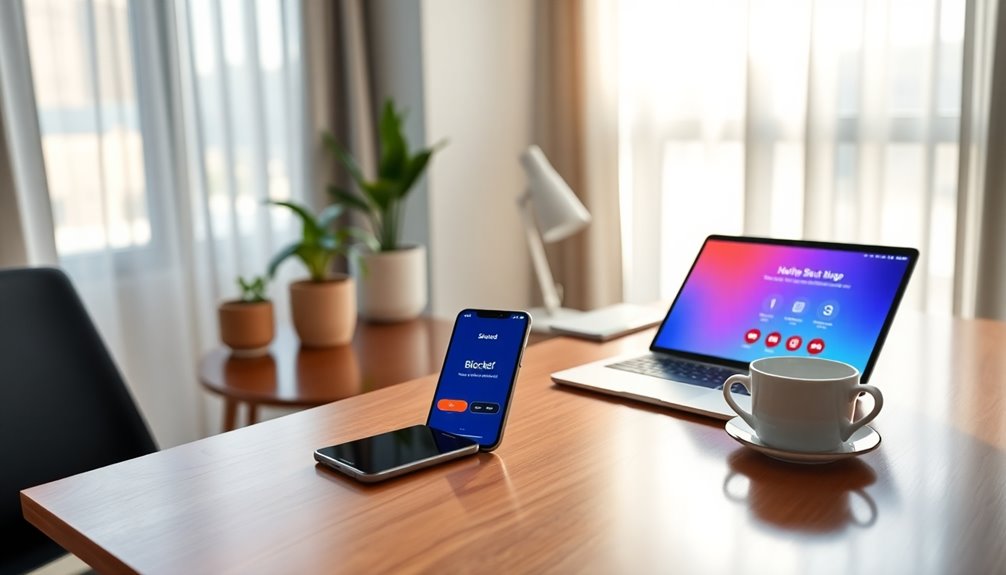You can effectively handle unwanted telemarketing calls by taking a few key steps. First, register your number on the Do Not Call Registry at www.donotcall.gov. This will help reduce the number of unwanted calls you receive. Use call-blocking tools offered by your phone company to filter out suspicious numbers. Stay alert for signs of scam calls, like high promises or pressure tactics. If calls persist, report them to the FTC. By maintaining control during these conversations and utilizing available resources, you can create a quieter phone experience. There's more you can do to further protect yourself.
Key Takeaways
- Register your phone number on the Do Not Call Registry at www.donotcall.gov to reduce unwanted calls indefinitely.
- Utilize call blocking tools and apps from your phone carrier to filter and block suspicious calls.
- Identify scam calls by being wary of high return promises, pressure tactics, or odd caller IDs.
- Report persistent unwanted calls to the FTC online or via phone, including detailed call information.
- Practice assertiveness during calls to regain control and set clear boundaries about the conversation.
Registering on the Do Not Call Registry

If you're tired of unwanted sales calls, registering on the Do Not Call Registry is a simple and effective way to reduce them.
You can register online at www.donotcall.gov or by calling 1-888-382-1222 from the number you want to register. Registration is free, and you can add up to three numbers at a time online.
Just remember to click the email confirmation link within 72 hours if you register online.
While the registry helps stop calls from legitimate companies, it won't block calls from scammers or organizations like charities. However, it is important to note that registration lasts indefinitely unless you remove your number.
Your number will stay on the registry indefinitely, but re-registration is needed if you disconnect or change your number.
Enjoy a quieter phone experience!
Utilizing Call Blocking Tools

After registering on the Do Not Call Registry, you can take your efforts a step further by utilizing call blocking tools.
Phone companies often offer services that proactively block suspicious calls, and you can enroll in additional options or manage your preferences. Many cell phones also have built-in features to block specific numbers and set "Do Not Disturb" hours. In addition, AI-based call blocking technology is expected to enhance the accuracy of identifying and blocking unwanted calls, leading to a better overall experience.
If you're looking for more flexibility, consider downloading third-party call blocking apps. These apps use user reports and data to filter unwanted calls and can block numbers based on area codes.
For landline users, installing dedicated call-blocking devices can effectively manage unwanted calls while allowing you to customize your settings.
Identifying Scam Calls

As you navigate your phone calls, being able to identify scam calls is crucial for protecting your personal information.
Watch for red flags like claims of being specially selected for an offer or promises of free prizes. If someone insists you've won a lottery or offers unusually high returns on investments, be wary. In fact, according to a Pindrop Security report, 1 in 2,200 calls is fraudulent, highlighting the need for vigilance.
Scammers often pressure you to make quick decisions or request sensitive information, like banking details or credit card numbers. Notice suspicious behavior, such as poor audio quality or reluctance to answer your questions.
Lastly, if the caller ID seems odd or the call starts with a robocall, hang up immediately. Trust your instincts; if it feels off, it probably is.
Reporting Unwanted Calls

Recognizing scam calls is just the first step; taking action by reporting unwanted calls can help combat this persistent issue. You can report these calls to the Federal Trade Commission (FTC) online at www.donotcall.gov or by calling 1-888-382-1222. Be sure to include detailed information like the date and time of the call. If you're registered on the National Do Not Call Registry and still receive calls after 31 days, file a complaint there as well. Additionally, mobile carriers like AT&T, T-Mobile, and Verizon offer specific apps to report spam calls. Many of these carriers also provide call-blocking services to help prevent unwanted calls from reaching you in the first place.
Leveraging Phone Company Resources

To effectively reduce unwanted calls, you can leverage the resources your phone company provides. Most carriers offer call blocking services that proactively stop illegal and unwanted calls. By enrolling in these services or installing dedicated apps, you can filter out suspicious numbers. Additionally, call labeling tools can help identify spam or scam calls right on your caller ID. For instance, Verizon and T-Mobile have features that alert you to potential scams. With ongoing advancements in technology, you can also adjust your phone settings to block specific numbers or utilize third-party apps like Nomorobo for extra protection. If you're worried about missing important calls, you can opt-out of automatic blocking services while still enhancing your defense against unwanted calls.
Understanding Recent Trends

Understanding recent trends in unwanted calls is essential for navigating the evolving landscape of communication.
With AI integration, call centers are becoming more efficient, as chatbots handle initial contacts and pre-qualify leads. While AI boosts productivity significantly, it often lacks the emotional intelligence needed for effective communication. The shift from reactive to proactive customer service approaches is also transforming how calls are managed.
Mobile gadgets are also on the rise, making it easier for you to contact businesses through various channels. Self-service operations are gaining traction too, allowing customers like you to resolve issues quickly and efficiently.
Starting January 27, 2025, stricter regulations will require explicit consent for telemarketing calls, ensuring businesses maintain transparency.
Staying informed about these trends helps you better manage unwanted calls and enhances your overall experience.
FTC Enforcement Actions

As you navigate the challenges posed by unwanted calls, it's important to be aware of the Federal Trade Commission's (FTC) enforcement actions aimed at combatting illegal robocallers and telemarketers.
The FTC has brought 167 cases against violators, resulting in over $2 billion in ordered payments. They've collected $394 million, which goes to refund defrauded consumers.
Enforcement also targets lead generators and VoIP providers, as seen in Operation Stop Scam Calls, encompassing 180 actions.
Additionally, the FTC has taken 151 actions against companies violating the Do Not Call Registry, resulting in more than $290 million in penalties and restitution.
These aggressive legal measures demonstrate the FTC's commitment to protecting consumers from unwanted calls.
Tips for Reducing Calls

While unwanted calls can be a nuisance, there are effective strategies you can implement to significantly reduce their frequency.
First, register your number with the National Do Not Call Registry by calling 1-888-382-1222 or visiting www.donotcall.gov. It's free and never expires.
Next, utilize your phone company's services, like Verizon's Call Filter or AT&T's ActiveArmor, to block unwanted calls proactively. Telemarketers cannot call registered numbers without permission, so this step is crucial. Additionally, consider setting up an emergency fund to manage any unexpected financial implications of unwanted calls disrupting your day.
You can also enable "Silence Unknown Callers" in your phone settings or download apps like RoboKiller or Hiya to filter out spam.
Don't forget to document unwanted calls and report them to the FTC or FCC.
These steps can help you regain control over your phone and reduce those pesky interruptions.
Managing Telemarketer Interactions

Navigating interactions with telemarketers can feel overwhelming, but you can take control of the conversation to make it more productive. Start by showing genuine interest in their needs, using their name to create a personal connection.
Keep the tone light and natural; don't sound scripted. Practice active listening—don't interrupt, and use verbal nods like "I see" to show engagement. Staying organized during calls can also help you address their points more effectively.
When objections arise, highlight your product's value and consider alternative solutions, like smaller packages. Respect their time by proposing follow-up calls at their convenience.
With each interaction, provide new value, whether through answers or relevant insights. This approach not only addresses concerns but also nurtures a relationship that could benefit both parties.
Frequently Asked Questions
Can Telemarketers Still Call After Registering on the Do Not Call Registry?
Yes, telemarketers can still call you after you register on the Do Not Call Registry, but there are limits.
Certain calls, like political, charitable, and survey calls, aren't covered. If you've done business with a company in the last 18 months, they can also call.
While the Registry helps reduce unwanted calls, many still complain about robocalls and live telemarketer calls, which means it's not foolproof.
What Should I Do if I Answer a Scam Call?
If you answer a scam call, hang up immediately.
Don't engage or provide any personal information, as this could lead to further attempts to scam you.
If you feel pressured, ask for a reference number and tell them you'll call back to verify their identity.
Always trust your instincts—if something feels off, it probably is.
After hanging up, consider blocking the number to prevent future calls.
Are There Penalties for Companies Violating the Do Not Call Rules?
Yes, there are serious penalties for companies violating Do-Not-Call rules. You could face fines up to $43,792 per call at the federal level.
States have their own penalties too, ranging from $100 to $25,000 per call. Repeated violations can lead to investigations, compounded fines, and even legal action.
It's crucial for telemarketers to comply with both federal and state regulations to avoid these costly repercussions and protect their reputation.
How Long Does My Number Stay on the Do Not Call Registry?
Your number stays on the Do Not Call Registry indefinitely, so you won't need to re-register unless you change your phone service or your number gets removed.
Registration is free, and you can easily do it online at DoNotCall.gov or by calling 1-888-382-1222.
Just remember, you'll get an email confirmation within 72 hours after registering. This helps keep your phone quieter, but it won't stop all unwanted calls.
Can I Block Unknown Numbers Without a Specific App?
Yes, you can block unknown numbers without a specific app.
On most Android phones, just open your Phone app, go to settings, and toggle on "Block unknown callers."
For Google Pixel phones, tap "More," then "Settings," and enable the "Unknown" option.
Samsung devices have a Smart Call feature for blocking.
Just remember, this mightn't work on all devices, so check your settings to find the right option for you.
Conclusion
In conclusion, handling unwanted telemarketing calls doesn't have to be a hassle. By registering on the Do Not Call Registry and using call-blocking tools, you can significantly reduce these interruptions. Stay informed about scam calls and don't hesitate to report them. Remember, your phone company often has resources to help, too. By taking these steps, you'll regain control over your phone and enjoy a quieter, more peaceful experience.









